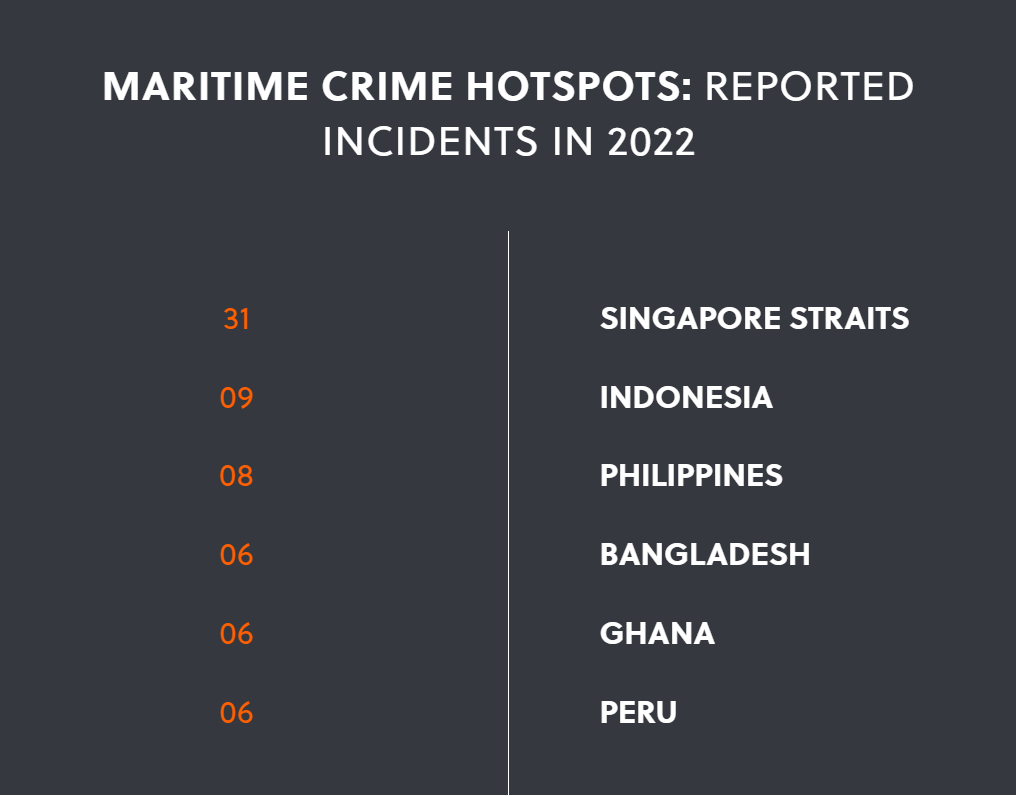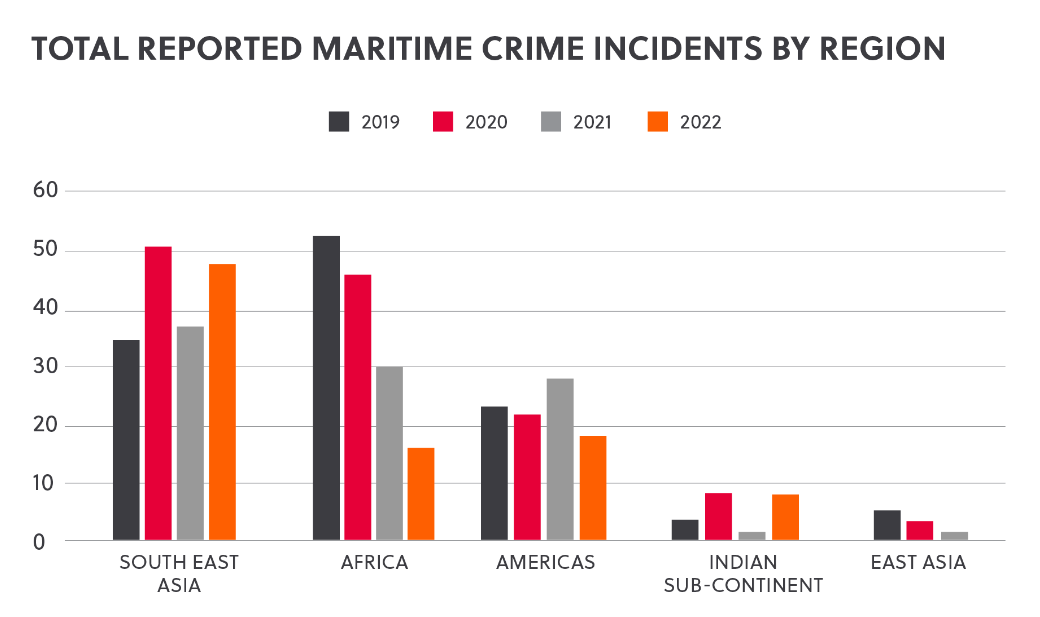Maritime crime: On course for calmer waters in 2023
In recent years, international trade has suffered from disruptions, delays and supply chain issues caused by the Covid-19 pandemic and, more recently, the Russia-Ukraine conflict. Organisations have understandably sought to build resilience across their global footprints. Here, offshore threats including maritime crime and piracy, have remained prominent and costly disruptors to international shipping, amassing to an average of USD 6 billion lost per annum in theft, ransoms, anti-piracy protection and increased insurance costs since 2018.
2022 offered some respite, with reported maritime crime and piracy cases at their lowest since 1992. However, while these figures are encouraging, there are concerns that the underreporting of incidents in some regions have obscured ongoing and persistent threats to the shipping sector. The billion-dollar question is whether the recent decline in reported incidents is a genuine indicator that maritime crime is on the decline, and whether this continue in 2023?
INTERROGATING THE NUMBERS
The latest 2022 International Maritime Bureau (IMB) statistics paint a positive picture in terms of reported maritime crime cases. With the exception of the Singapore Straits, virtually all previous piracy hotspots showed a significant reduction in offshore piracy and maritime crime in territorial waters. Incidents in the Gulf of Guinea have continued a downward trend, with 13 reported incidents in the first three quarters of 2022, compared to 21 in 2021 and 44 in 2020. Similarly, following a spike in maritime crime in the Callao anchorage in Peru in 2021, there has been a subsequent drop in 2022, with an overall decline in reported cases throughout Latin America. The Singapore Straits is an area of concern, though, and has continued its upward trend over the first nine months of 2022, with 31 reported incidents of maritime crime, compared to 20 in 2021 and 15 in 2020.
Despite the increase in incidents in the Singapore Straits, most reported cases have involved minor theft. The typical modus operandi here has been to board ships, predominantly bulk carriers and tankers while steaming and stealing equipment from vessels’ stores. Similarly, in the Gulf of Guinea, barring two offshore incidents of piracy, most reported cases include petty theft while vessels are in anchorage. Although violence towards crew has reduced considerably since 2018 and 2019, there have still been 38 reported cases in 2022, with criminals taking at least 27 crew members hostage. Most incidents in 2022 have also occurred within countries’ territorial waters and anchorages and primarily involved perpetrators armed with rudimentary weapons, including long knives or firearms in isolated cases.

A GLOBAL REVIEW
ASIA
The increase in maritime crime in the Singapore Straits is an anomaly in southeast Asia, with reported cases stabilising in domestic waters around countries such as the Philippines over the past year. Most incidents have occurred off the Indonesian archipelago within the Singapore Straits and although these islands were impacted socioeconomically by the fallout of the Covid-19 pandemic, resulting in higher unemployment, there are other reasons which likely account for the increase in cases. China’s growing influence within the South China Sea has prompted a spike in the number of Chinese fishing boats off Indonesia’s Natuna Islands. Indonesia responded in late 2019 and early 2020 by deploying warships to the area, which had a secondary consequence of halting maritime crime activities off the islands. This has led criminal groups to shift their operations southwest into the Singapore Straits and capitalise on the high flows of maritime traffic in the region.
Considering the economic importance of the shipping corridor through the straits, Singapore, Malaysia, and particularly Indonesia will be under pressure respond in 2023. However, the recent developments in the South China Sea and around the Natuna Islands suggests regional and international security forces will have their work cut out for them. Under and delayed reporting have also hampered security forces in their efforts to adequately respond to incidents and improved communication between authorities and vessels will be an important aspect of enhanced maritime security within the region in 2023.
AFRICA
International efforts to curb offshore piracy, combined with the cooperation of local authorities, have paid off in regions such as the Gulf of Aden and the Gulf of Guinea, which until recently, had been the global epicentre of maritime crime and piracy. European navy vessels patrolling West Africa, as well as Nigeria’s Deep Blue Project (DBP), a maritime security program, are strong deterrents for potential pirates. However, the underlying security situation onshore within areas such as the Niger Delta has not significantly improved, with indications that criminal groups are now engaging in less risky activities such as oil bunkering and smuggling activities, while also carrying out low-scale attacks on vessels in places such as Takoradi in Ghana. There are also concerns that governments in the Gulf of Guinea have been less eager to report incidents to avoid a decrease in maritime traffic through their ports.
In West Africa - provided both international and local organisations continue their patrolling and surveillance activities in the Gulf of Guinea - the downward trend will likely continue. But it is unclear if this will be sustainable in the long-term considering the onshore security situation and the potential for increased crime rates amid deteriorating socioeconomic conditions. Additionally, 17 out of the 27 reported maritime hostages in 2022 were taken in the Gulf of Guinea. While this number has declined compared to 2021, these incidents are a clear reminder that the threat persists.
LATIN AMERICA
Increased coordinated international, regional, and national efforts to reduce the threat of maritime crime have seen notable success in Latin America. Measures such as the Europe Latin America Programme of Assistance against Transnational Organised Crime (El PacCTO), the Evaluation of the Threat of Transnational Organised Crime in Latin America – IDEAL 1.0, and the Container Control Program, all prioritise the fight against drug trafficking through maritime routes by promoting regional information sharing. These initiatives have also had a positive impact on regional port security. On top of coordinated measures in the Latin American bloc, some countries, such as Peru and Ecuador, have adopted more drastic national measures. Since February 2022, a state of emergency has been in place in Lima and Callao aimed at combatting criminal gangs and has likely accounted for the overall drop in incidents at the Callao anchorage.
Ramped up efforts against organised crime and specifically maritime crime in the region have resulted in a decrease in port robberies, and this trend is expected to continue into 2023 if regional leaders maintain their current efforts. Furthermore, investment and coordination from international actors has seen the proliferation of general anti-crime workshops that have had positive spill over effects in the maritime sector, which are likely to filter into 2023.

NO ROOM FOR COMPLACENCY IN 2023
Despite the drop in cases in 2022, incidents of maritime crime still occur, posing a threat to commercial vessels travelling through insecure ports and piracy hotspots. Security forces have improved their approach in many regions, and the trend of limited attacks and petty theft will likely be the primary concern over the next 12 months. However, the deteriorating global economic situation has the potential to increase crime in 2023, including maritime crime and offshore piracy. While the waters may seem calm on the surface, international shipping companies and security organisations can ill afford to let their guard down. Doing so could have costly consequences.
